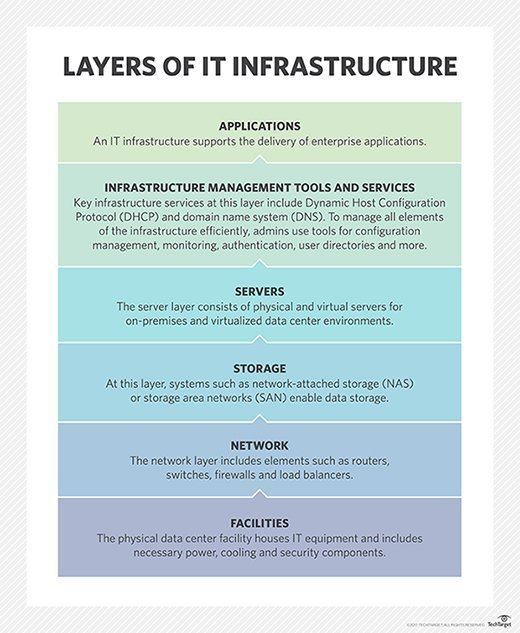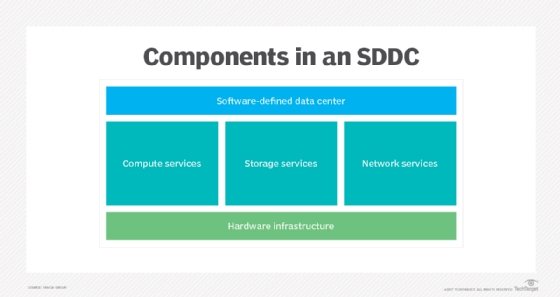Microsoft System Center
What is Microsoft System Center?
Microsoft System Center is a suite of software products designed to simplify the deployment, configuration and management of IT infrastructure and virtualized software-defined data centers (SDDCs). Suitable for both on-premises and hybrid cloud environments, System Center products support IT administrators with infrastructure provisioning, infrastructure monitoring, automation, backup and IT service management.
Microsoft System Center 2022 is an enterprise-class data center management software suite. It became generally available in April 2022. Its products support unified IT deployment and management across both on-premises data centers and hybrid cloud environments and incorporate advanced capabilities and features for simplified data center management across diverse IT environments and business models.
Modern data center environments consist of multiple components, such as compute, networking and storage. They often utilize Windows Server, Azure Stack HCI, VMWare deployments and more. These elements increase the complexity of data centers and create numerous challenges around data center management. System Center reduces infrastructure management complexity and enables data center managers to effectively manage an entire IT environment, no matter how diverse it is.

Components of Microsoft System Center
First released in 2008, Microsoft System Center simplifies data center management across all enterprise IT environments. The latest version is System Center 2022, which consists of five different software products:
- System Center Operations Manager (SCOM). SCOM monitors IT health, capacity and usage across applications, workloads and infrastructure.
- System Center Orchestrator (SCORCH). SCORCH enables IT managers to automate a variety of data center tasks and create runbooks with native PowerShell scripts.
- System Center Virtual Machine Manager (VMM). SCVMM provides a comprehensive tool for networking, storage, compute and security to simplify the deployment and management of virtualized SDDCs.
- System Center Service Manager (SM). SM automates and streamlines incident resolution, change control and asset lifecycle management.
- System Center Data Protection Manager (DPM). DPM provides data backup, recovery and protection for private clouds, physical machines, clients and server applications.
Each of these products serves a specialized purpose and is available individually. However, they work best together to deliver unified management of data centers and heterogenous infrastructure.

Infrastructure management capabilities of Microsoft System Center
System Center unifies data center management practices, regardless of underlying platforms or the heterogeneity of the data center. Data centers using Windows Server 2022 and SQL Server infrastructure especially can benefit from the tool set available in System Center 2022, but the suite also supports the management of Azure Stack HCI 21H2, VMware 7.0 hosts and the latest Linux distributions.
In addition, System Center 2022 enables IT and data center managers to do the following:
- Create, configure and register HCI 21H2 clusters.
- Control virtual machines on HCI clusters.
- Monitor Azure Stack HCI clusters.
- Set up software-defined networking (SDN) controllers.
- Manage storage pools from VMM.
Data center managers and their teams can use System Center VMM to assign both IPv4 and IPv6 addresses to SDN deployments. This enables them to meet the demands of growing hybrid environments.
Benefits of Microsoft System Center
System Center is a comprehensive platform for networking, storage, compute and security, which enables organizations to easily deploy and manage their SDDCs. It simplifies data center operations so that organizations can control their IT estate across all environments and platforms. Its products enable IT managers to easily manage heterogenous infrastructure and unify workload management across Windows Server, SQL Server, Linux, Azure Stack HCI, VMware and Hyper-V environments.
The System Center suite provides anywhere access to Azure management services with Azure Arc, which eases hybrid management. It also includes multiple automated workflow processes and self-service options.
System Center products also streamline infrastructure and workload monitoring. IT managers can use its various components to quickly diagnose and troubleshoot issues related to their infrastructure, workloads or applications and thus maintain consistent reliability and high performance across the environment.
The key benefits of System Center 2022 are the following:
- Consistent control and granular monitoring of all environments.
- Enhanced access control capabilities to simplify permissions management for monitoring data and alert actions.
- Integration with Microsoft Teams to reduce the circle time between application owners and IT administrators.
- Greater control and speed for data backups and restores.
- Automatic alert notifications to developers for their applications on Teams channels.
- Accommodation of DevOps environments and teams.
Support for Azure Arc
Azure Arc is a service that enables admins and developers to build and operate applications and Azure services across data centers, at the edge and in multi-cloud environments. It extends the Azure platform and provides a consistent development, operations and security model to create cloud-native applications and run them on Kubernetes.
Azure Arc supports System Center VMM and enables data center managers to do the following:
- Configure and manage various data center components as a single fabric in VMM.
- Provision and manage Hyper-V and VMware hosts and clusters.
- Provision and assign local and remote storage.
- Deploy VMs and services on virtualization hosts.
Together, System Center 2022 and Azure Arc enable the seamless governance, management and security of Windows and Linux servers, Kubernetes clusters and applications in hybrid environments. Organizations can use their existing investments in System Center with Azure Arc to modernize their cloud-native solutions.
See how to use Azure Arc-enabled Kubernetes and why you should adopt a software-defined data center architecture with caution and proper planning.








